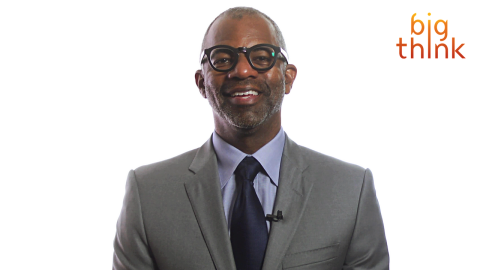Dr. Tony Coles Explains the Tenets of Service Leadership

In 1970, Robert K. Greenleaf coined the term “servant leadership” around which he built a vaunted legacy for promoting the philosophy of leadership that enriches the lives of others and betters the world overall. It’s a philosophy that has guided Dr. Tony Coles for the past decade of his life, an experience he discusses in the Big Think video interview below. The video previews Dr. Cole’s lesson, “Serve Your Purpose: Redefining Leadership as Service,” available exclusively on Big Think+:
The origins of servant leadership can be found in Greenleaf’s 1970 essay, “The Servant as Leader,” which you can read in full here.
“It begins with the natural feeling that one wants to serve, to serve first,” Greenleaf wrote. “Then conscious choice brings one to aspire to lead.”
Dr. Coles, the former CEO of Onyx Pharmaceuticals and current leader at Yumanity, explains the basic tenets of servant leadership in the video above while walking through how he’s applied these concepts in his own career. As CEO of Onyx, he would iterate to his employees that he worked for them rather than the other way around. His guiding philosophy stipulated that his role was to serve everyone who had a stake in him: employees, patients, families of patients, shareholders, etc.:
“The more you recognize that you’re a servant of these various constituencies, the more rewarding the experience will be — [it] certainly has been for me. But if you actually think about it, when you recognize whom you work for, you can actually create even more value as a result of that.”
That last point is key. Sure, there’s something of an altruistic component to seeing yourself as a servant leader. But Coles stresses that servant leadership all too often results in boosted productivity and broader success. This is because, especially in an industry like pharmaceuticals, a leader who acts primarily in his or her own self-interest will stifle progress and hurt the organization. That’s because business is built not on individual personalities, but on teamwork. Decisions are made and innovations explored by groups working well together, not by fat cats stockpiling power from behind a desk. Coles stresses that adopting servant leadership as a guiding philosophy is an act of self-recognition:
“I think the most important recognition for any leader is that you actually cannot do it alone, that your job is to get the absolute best out of people. And the incentive is really on the leader to lean in and to meet anyone who works for him or her more than halfway because it’s your job to get the best out of everyone.”
As soon as you identify yourself as a servant leader rather than an autocratic executive, the path becomes clear for how to best act in the interests of your stakeholders. In doing so, you’re likely to operate your organization more efficiently while also creating an environment where employees feel comfortable to do their best work. As you reflect on your own leadership style, think about the ways in which you can adopt these tenets and consider the places in which a little improvement would be most welcome.
“Serve Your Purpose: Redefine Leadership as Service” with Dr. Tony Coles is available exclusively on Big Think+.




